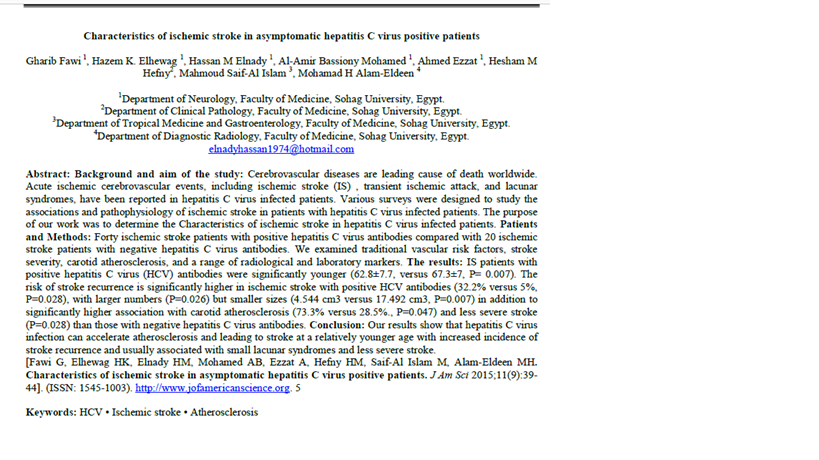Background and aim of the study: Cerebrovascular diseases are leading cause of death worldwide.
Acute ischemic cerebrovascular events, including ischemic stroke (IS) , transient ischemic attack, and lacunar syndromes, have been reported in hepatitis C virus infected patients. Various surveys were designed to study the associations and pathophysiology of ischemic stroke in patients with hepatitis C virus infected patients. The purpose of our work was to determine the Characteristics of ischemic stroke in hepatitis C virus infected patients. Patients and Methods:
Forty ischemic stroke patients with positive hepatitis C virus antibodies compared with 20 ischemic stroke patients with negative hepatitis C virus antibodies. We examined traditional vascular risk factors, stroke severity, carotid atherosclerosis, and a range of radiological and laboratory markers.
The results:
IS patients with positive hepatitis C virus (HCV) antibodies were significantly younger (62.8±7.7, versus 67.3±7, P= 0.007). The risk of stroke recurrence is significantly higher in ischemic stroke with positive HCV antibodies (32.2% versus 5%, P=0.028), with larger numbers (P=0.026) but smaller sizes (4.544 cm3 versus 17.492 cm3, P=0.007) in addition to significantly higher association with carotid atherosclerosis (73.3% versus 28.5%., P=0.047) and less severe stroke (P=0.028) than those with negative hepatitis C virus antibodies. Conclusion:
Our results show that hepatitis C virus infection can accelerate atherosclerosis and leading to stroke at a relatively younger age with increased incidence of stroke recurrence and usually associated with small lacunar syndromes and less severe stroke.
.jpg)

